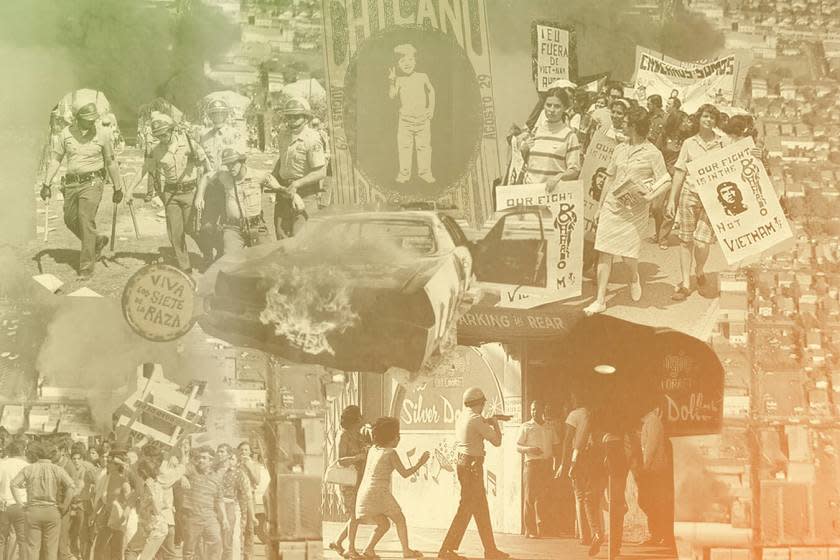How Los Angeles is commemorating the 50th anniversary of the Chicano Moratorium

Fifty years after the Chicano Moratorium of Aug. 29, 1970 — a peace march and rally against the Vietnam War that turned violent amid police response and left three dead, including journalist Ruben Salazar — a series of marches, forums, screenings and more this week examine that pivotal moment and show how the issues are still relevant in the current climate of protest.
The Chicano Rebellion Reconsidered 50 Years Later
What: A virtual screening of the Phillip Rodriguez-directed documentary "Ruben Salazar: Man in the Middle" with opening remarks by Mayor Eric Garcetti and actor-producer Edward James Olmos, followed by a live discussion and Q&A with Rodriguez, U.S. Rep. Joaquin Castro, Univision "Edición Digital California" anchor Yarel Ramos, grassroots network Mijente co-founder Neidi Dominguez, author and educator Myriam Gurba and L.A. Times staff writer Daniel Hernandez.
When: 5 to 7 p.m. Saturday
Info: Register at chicanorebellionreconsidered.splashthat.com or USC Annenberg events page.
Cost: Free
L.A. Times Chicano Moratorium Forum
What: A virtual community forum on the National Chicano Moratorium Against the Vietnam War held 50 years ago on Aug. 29. Hosted by Column One editor Steve Padilla, with Times reporters Daniel Hernandez and Carolina A. Miranda, and former Times reporter Robert Lopez, who has written about the theories still swirling around Salazar’s death.
When: 7 p.m. Thursday
Where: Live stream on the L.A. Times website, Facebook page, YouTube channel and Twitter feed.
Cost: Free
READ THE LA TIMES SPECIAL SERIES: The Chicano Moratorium 50 Years Later
"August 29"
What: A sneak-peek virtual reading of the play "August 29," written and first produced in 1990 by members of the Latino Theater Company, then known as the Latino Theater Lab. The play will receive a full stage production in 2021.
When: 7 p.m. Friday. A discussion of the play will take place at 7 p.m. Thursday.
Where: Links available at thelatc.org.
Cost: Free.
Brown Berets Chicano Moratorium March
What: A Brown Berets march, speeches, reception and performance of Teatro Urbano’s play “The Silver Dollar” at an outdoor theater on the site of the Silver Dollar Bar & Cafe, where journalist Ruben Salazar was killed.
When: 3 to 6 p.m. Saturday
Where: Meet between 3 and 4 p.m. at 4945 Whittier Blvd., Los Angeles, site of the Silver Dollar, now Sounds of Music. (Some participants will meet between 1 and 3 p.m. at Belvedere Park and march to the Silver Dollar site.) After speeches and performance, march departs Whittier Boulevard location for Belvedere Park and outdoor theater at East Los Angeles Library, 4837 E. 3rd St., Los Angeles. Reception will follow.
Info: brownberet.us/upcoming-events or facebook.com/brownberetnational
50th Chicano Moratorium Committee March and Caravan
What: A march and socially distant car caravan hosted by the 50th Chicano Moratorium committee along Whittier Boulevard to the site of the Silver Dollar Bar & Cafe for an outdoor performance of Teatro Urbano’s play “The Silver Dollar” and a program at Ruben F. Salazar Park.
When: 10 a.m. to 5 p.m. Saturday
Where: 50th Chicano Moratorium car caravan meets at 10 a.m. and departs 11 a.m. from Gregg Road and Whittier Boulevard; the group’s march meets 10 a.m. at Atlantic Park, 570 S Atlantic Blvd., Los Angeles. Caravan and march will stop at 4945 Whittier Blvd. (now Sounds of Music) for “The Silver Dollar” performance on the way to Ruben F. Salazar Park, 3864 Whittier Blvd, Los Angeles.
Info: chicano-moratorium-com or Chicano Moratorium Facebook page.
Chicano Moratorium Organizing Committee Webinars
What: The 50th Chicano Moratorium Organizing Committee hosts a daily webinar series with activists, artists and others taking part in discussions, short screenings and performances. Hosted by Lupe Carrasco Cordona, Carlos Montes, Benjamin Prado and Sol Már.
When: 5 to 6:30 p.m. daily through Sunday, all day on Saturday
Info: chicano-moratorium.com, 50th Chicano Moratorium Facebook events page or live streaming from co-chair Lupe Carrasco Cardona's Facebook page or Ethnic Studies Now Coalition Facebook page, with past seminars viewable in the video section of mentioned Facebook pages.
Cost: Free
NAHJ panel discussion
“Remembering the Life and Death of Ruben Salazar,” a 40-minute virtual panel discussion followed by a 40-minute question-and-answer session, hosted by the National Assn. of Hispanic Journalists, will be moderated by Associated Press reporter Russell Contreras with photojournalist Monica Almeida; L.A. Times reporter Esmeralda Bermudez; University of Texas at Austin journalism professor Maggie Rivas-Rodriguez; Dawn Garcia, director of the John S. Knight Journalism Fellowships at Stanford University; and filmmaker Phillip Rodriguez, director of "Ruben Salazar: Man in the Middle," and more.
When: 10 a.m. Saturday
Info: Register for the webinar at nahj.org/events.
UCLA Chicano Moratorium film screening
The UCLA Film & Television Archive, partnering with the UCLA Chicano Studies Research Center, presented a still-viewable selection of short films on Aug. 24, examining moments of activism in East Los Angeles to commemorate the 50th anniversary of the Chicano Moratorium. Clips include an episode of 1968's mostly English-language telenovela "Canción de la Raza" (Song of the People), 1971's "The Chicano Moratorium: A Question of Freedom" by Thomas Myrdahl, and excerpts of interviews with Ruben Salazar on the television shows "The Siesta Is Over" and "Tempo." Artist Harry Gamboa Jr. and Times writer Carolina A. Miranda join a post-screening discussion with moderator Chon Noriega, director of UCLA Chicano Studies Research Center and author of "Shot in America: Television, the State, and the Rise of Chicano Cinema." Viewing link on the UCLA Film & Television Archive site and on Vimeo.
